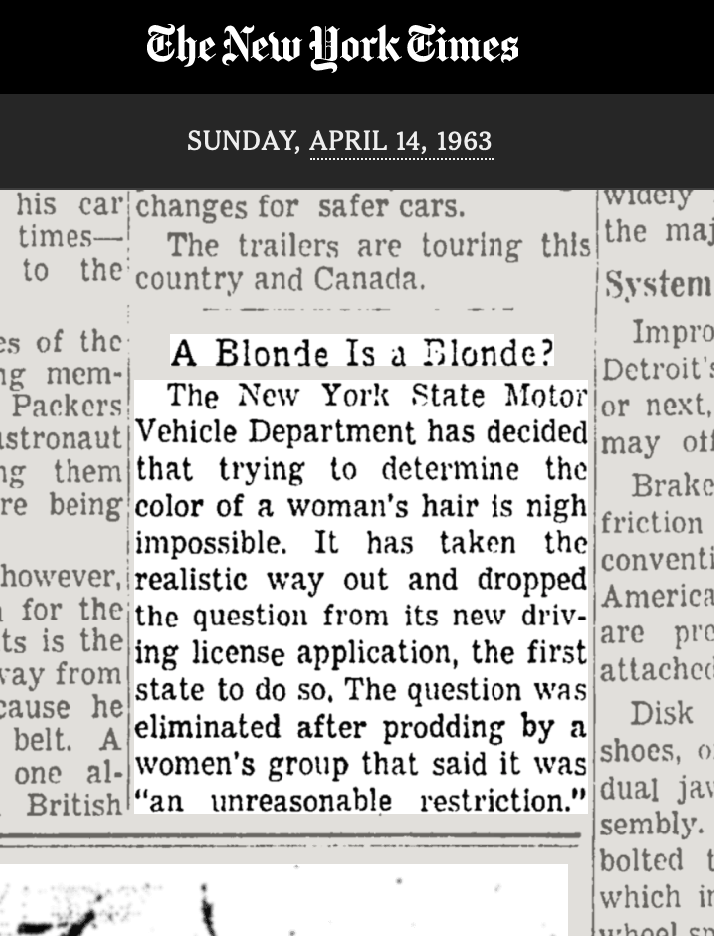August 16, 2025
"It's tricknological, when white people invoke the holocaust. allows them to step out of their whiteness and slip on fake oppression."
August 15, 2024
"It’s the people who aren’t artists who sacrifice. Artists somehow stumble onto the best life in the world, and I have no complaints."
She sometimes said that if she had not married Mr. Cassavetes, her career might have taken a very different turn: She could have been the blonde in romantic comedies. But, she contended, physical beauty was so common in Hollywood that it was irrelevant. When People magazine named her one of the most beautiful people in the world (she was 69) and asked for beauty tips, she suggested: “Sunglasses are the secret. Sunglasses and a little lipstick will take you to the market.”
Virginia Cathryn Rowlands was born on June 19, 1930, in Madison, Wis....
ADDED: Here's the clip from "A Woman Under the Influence" that I blogged when Peter Falk died in 2011:
One workday, while we were waiting to shoot, Roman [Polanski] was discoursing about the impossibility of long-term monogamy given the brevity of a man's sexual attraction to any woman. An impassioned John Cassavetes responded that Roman knew nothing about women, or relationships, and that he, John, was more attracted than ever to his wife, Gena Rowlands. Roman stared at him and blinked a few times, and for once had no reply.
June 14, 2024
"Jeremy was competitive while young and felt immense pressure to demonstrate gifted achievement every day."
Writes David Brooks, in "What Happens to Gifted Children" (NYT).
January 19, 2023
"When the daughter with visibly brown roots insists that having blond hair as a child makes her a natural blonde, she is saying something I have heard countless people say."
"I have always been puzzled by it. What could be so important about a genetic trait that someone would use it to describe herself long after the trait’s phenotypic expression — light hair — no longer exists? It makes literal sense only if by blonde she is referring to something more than hair. Being a natural blonde must confer honor, esteem and power to those who can legitimately claim it. Guess how we define social status? It is as a role or identity that confers honor, esteem and power to those who legitimately hold it.... People who were born blond and now have dark hair were among the angriest. They insisted that being a 'natural blonde' should matter more than their actual hair color. When pushed on what makes that matter, they got even angrier.... That is the thing about status. We all want it, but, should we acquire it, we don’t want it to mean anything...."
Writes Tressie McMillan Cottom in "The Enduring, Invisible Power of Blond" (NYT). The author, a sociologist, is black. Here's her TikTok that made people mad:
October 1, 2022
What is a blonde?
Here's something from 1963 in the NYT that I chanced into as I was looking for the review of the new Netflix film titled "Blonde":

Who knew there were women's groups back then taking aim at such minor intrusions on female freedom? It seems more like something that would come up today.
April 10, 2018
"Caucasians are able to jump around, and it’s not a big deal for them to be blond, a redhead or brunet, whereas those same rules don’t apply to us"
Said Greta Lee, an actress, quoted in "Why So Many Asian-American Women Are Bleaching Their Hair Blond" (NYT).
Why is blond hair so important? I googled that and ended up in the obvious place, Wikipedia, which has a really long article on the subject. Excerpt, under the heading "Sexuality":
In contemporary popular culture, blonde women are stereotyped as being more sexually attractive to men than women with other hair colors.... Some women have reported they feel other people expect them to be more fun-loving after having lightened their hair. The American novelist and screenwriter Raymond Chandler offers an appraisal of the blonde as social criticism in his novel The Long Goodbye (1953):



